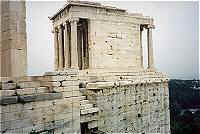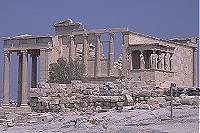|
Pericles' Funeral Oration
Pericles and
America
Pericles and Philadelphia
Aeschylus' Oresteia
Sophocles'
Oedipus and the Sphinx
Plato's Apology
Plato's Crito
Yet
to be illustrated:
Dr.
J's Lecture on Socrates
|
|
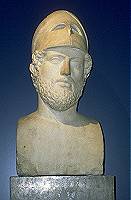 Dr.
J's Illustrated Pericles' Funeral Oration Dr.
J's Illustrated Pericles' Funeral Oration
"Poets,
priests and politicians have words to thank for their positions..."
"Doo-doo-doo-de dah-dah dah" by The Police
The purpose of
this illustrated lecture is to provide context for the student who strives to understand
what kind of place Periclean Athens was. Dr. J's
Illustrated Pericles and America lecture explains how fifth century Greek values
compare to our modern American ones, and Dr. J's
Illustrated Pericles and Philadelphia compares Periclean Athens to a
great American city I lived in for a time.
The
Typical Athenian Soldier's Burial |
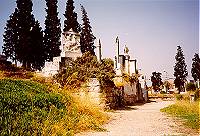 In
his introduction to Pericles' Funeral Oration, the historian Thucydides explains the
time-honored practice of providing public funerals to Athenian soldiers killed in battle:
"The dead are laid in the public
sepulchre,
maintained for those who fall in war, in the most beautiful suburb of the city..." This "suburb" is the Keramikos, just north of the Agora,
and the site of state heroes' tombs from the fifth century onward. Pausanias tells us that
he even saw Pericles' own tomb there when he passed through in about 200 AD. We give our
statesmen equally honorable treatment upon their deaths. In
his introduction to Pericles' Funeral Oration, the historian Thucydides explains the
time-honored practice of providing public funerals to Athenian soldiers killed in battle:
"The dead are laid in the public
sepulchre,
maintained for those who fall in war, in the most beautiful suburb of the city..." This "suburb" is the Keramikos, just north of the Agora,
and the site of state heroes' tombs from the fifth century onward. Pausanias tells us that
he even saw Pericles' own tomb there when he passed through in about 200 AD. We give our
statesmen equally honorable treatment upon their deaths. |
The
Exceptional Place of Marathon
in the Hearts of Athenians |
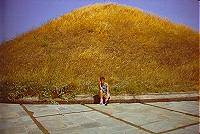 Before
relating the speech that Pericles gives to honor those Athenian soldiers who fell during
the first year of the Peloponnesian War, Thucydides reminds us that a similar state-funded
ceremonial burial is afforded all Athenian war dead with the exception of those who a
generation earlier died at the4
Battle of Marathon:
"...who for their singular and extraordinary
valor were interred where they fell." Marathon is probably the most important battle in Greek History; it is
certainly the most celebrated. 192 Athenian soldiers died fighting the Persians at
Marathon, including the brother of the playwright Aeschylus. Before
relating the speech that Pericles gives to honor those Athenian soldiers who fell during
the first year of the Peloponnesian War, Thucydides reminds us that a similar state-funded
ceremonial burial is afforded all Athenian war dead with the exception of those who a
generation earlier died at the4
Battle of Marathon:
"...who for their singular and extraordinary
valor were interred where they fell." Marathon is probably the most important battle in Greek History; it is
certainly the most celebrated. 192 Athenian soldiers died fighting the Persians at
Marathon, including the brother of the playwright Aeschylus. They are buried in a grave mound called
the "soros" (upper left). A modern reconstruction of the ancient memorial
listing the names of the dead by tribe is on display as well (right). Our own Vietnam Memorial in Washington D.C. uses a similar
method of recognizing the very special sacrifice made by each and every American soldier
who died in the defense of freedom in South Vietnam (but go to Pericles and America for more on that). They are buried in a grave mound called
the "soros" (upper left). A modern reconstruction of the ancient memorial
listing the names of the dead by tribe is on display as well (right). Our own Vietnam Memorial in Washington D.C. uses a similar
method of recognizing the very special sacrifice made by each and every American soldier
who died in the defense of freedom in South Vietnam (but go to Pericles and America for more on that). |
| The
Individual and the Community in Athens |
| Pericles praises
Athens for her form of government - democracy - because it is only in a democracy that
citizens are encouraged to contribute and participate in self-rule. Democracy brings
equality, merit brings public success, social and economic mobility is encouraged, the law
protects all: "We alone consider
the man who refuses to take part in city affairs useless," Pericles announces. And he gets in a jab at Sparta
by proudly proclaiming that "rather
than look upon discussion as a stumbling-block in the way of action, we think it is an
indispensable preliminary to any wise action at all." The institutions of Athenian democracy back
up Pericles' claim: ordinary citizens made up almost all the governing bodies of 5th
century Athens, including the Ekklesia, the boule, and the prytaneis.
The Ekklesia, or Assembly, which passed laws and made policy decisions, met on
the Hill of the Pnyx (all citizens were eligible to attend such meetings and speak up).
The Boule, or Council of the 500, was charged with administering decisions made
by the Ekklesia and met in the Bouleterion in the Agora. The prytaneis,
or "Presidential Council," was a subcommittee of the boule and lived at
state expense in the tholos, or "Round Building" in the Agora. By
Pericles' time, the Areopagus (named for the Hill of Ares it sits on) had lost a
lot of its power since the previous era, but it was still the court where murder cases
were tried.
 |
 |
 |
 |
| Pnyx |
Bouleterion |
Areopagus |
Tholos |
Go to Pericles and Philadelphia to see
some similarities concerning citizens' rights and responsibilities. |
Pericles encourages his audience "to
realize the greatness of Athens"
and enjoy everything the city has to offer: "Further, we provide many ways to
refresh the mind from the burdens of business. We hold contests and offer sacrifices all
the year round, and the elegance of our private establishments forms a daily source of
pleasure and helps to drive away sorrow. The magnitude of our city draws the produce of
the world into our harbor, so that to the Athenian the fruits of other countries are as
familiar a luxury as those of his own."
 |
 |
 |
 |
 |
| stadium |
theater |
agora |
fruits of the harbor |
more fruits! |
Athletic contests
would have taken place at the site of this modern marble stadium, built on the foundations
of the ancient stadium; theatrical competitions would have been produced in the Theater of Dionysus, on the
south slope of the Acropolis (musical and poetic exhibitions, as well as pre-theatrical
events, would have been produced in the Odeion built by Pericles - right next to the
Theater of Dionysus - but of which no remains really survive); citizens and visitors would
have congregated in the Agora to converse
with neighbors and visitors, get the daily news, read public announcements, shop, and
perform whatever civic responsibilities they had. Socrates did. And the fruits of the
world are indeed available at Aegean ports such as Piraeus, Athens' harbor. All of this
contributes to the sense of community Pericles boasts about. The "sacrifices"
he
mentions off-handedly are almost the only reference in his entire speech to the religious
aspect of the Athenians' lives, which brings us to Pericles' Building Program on the
Acropolis. |
Pericles'
Building Program |
What is
Pericles'
plan? Although a democratic state, Periclean Athens appears to have a philosophy similar
to that of the aristocratically-led Pesistratid Tyranny that preceded it in the sixth
century BC: to prove by a glorious show of wealth and power his deep-seated belief that
Athens is politically, economically, militarily, culturally and morally superior to her
neighbors. Compare the grandeur of these two buildings, the time-ravaged Temple  of Olympian Zeus
designed - but never built - by the Pesistratids (left), and Parthenon of Pericles
(right), who, by the way, was called the "Olympian" by his detractors. This
sense of superiority and arrogance (or is it justifiable pride?) comes through loud and
clear in Pericles' speech. Pericles is particularly proud of of Olympian Zeus
designed - but never built - by the Pesistratids (left), and Parthenon of Pericles
(right), who, by the way, was called the "Olympian" by his detractors. This
sense of superiority and arrogance (or is it justifiable pride?) comes through loud and
clear in Pericles' speech. Pericles is particularly proud of "the imperishable monuments" his generation will leave behind, as they stand as
incontrovertible proof of Athens' greatness: of Olympian Zeus
designed - but never built - by the Pesistratids (left), and Parthenon of Pericles
(right), who, by the way, was called the "Olympian" by his detractors. This
sense of superiority and arrogance (or is it justifiable pride?) comes through loud and
clear in Pericles' speech. Pericles is particularly proud of of Olympian Zeus
designed - but never built - by the Pesistratids (left), and Parthenon of Pericles
(right), who, by the way, was called the "Olympian" by his detractors. This
sense of superiority and arrogance (or is it justifiable pride?) comes through loud and
clear in Pericles' speech. Pericles is particularly proud of "the imperishable monuments" his generation will leave behind, as they stand as
incontrovertible proof of Athens' greatness:"Such is the Athens for which these men, in
the assertion of their resolve not to lose her, nobly fought and died; and well may every
one of their survivors be ready to suffer in her cause."
And Pericles has reason to be proud - without
him, neither the Parthenon nor the Propylaia - or perhaps even the later Erechtheum and
Temple of Athena Nike - would have been built. For these buildings all belong to Pericles'
Great Building Program.
For a complete rundown on the
events that led to Athens' supremacy in the Aegean in the fifth century, go to
Dr. J's Illustrated Persian
Wars and
Dr. J's
Illustrated Classical Age pages. But here are the basic important factors:
480: Persians attack
Athens and burn the buildings/temples down.
479: Greeks defeat Persia at Plataea and vow not to rebuild anything destroyed by the
Persians to keep the memory of their impiety fresh.
477: formation of the Delian League, a protection racket run by Athens to keep Greek
colonies/city-states safe from Persia
454: Athens moves the League treasury from Delos to Athens (corrected
10/13/02)
449: Athens comes to terms with Persia
447: Athens begins building the Parthenon (with League funds!) |
But Pericles wasn't
without his political enemies, who riled up the Athenian populace against him, accusing
him of wasting state funds. Plutarch (an admittedly iffy historical source), provides
Pericles' brilliant retort and the people's response:
"'Then be it charged to my
account, not yours - only let the new edifices be inscribed with my name, not that of the
people of Athens.' Whether it was that they admired the greatness of his spirit, or were
ambitious to share the glory of such magnificent works, they cried out that Pericles might
spend as much as he pleased of the public treasure, without sparing it in the least."
(Plutarch's Life of
Pericles; tr: Eduard C. Lindeman)
And so he did.
Another important detail is that
in 510 BC, the Oracle of Delphi had proclaimed that only temples and shrines should occupy
the Acropolis (up until that time, people actually lived on the rock). So it can be said
that Pericles was fulfilling the oracle's decree - that he built a City of Temples to
honor the gods, providing a religious center on the Acropolis just as the Agora was the
civic center down below. But there are big holes in this argument.
|
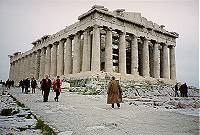 The jewel in the
crown of Pericles' Building Project is certainly the Parthenon, the most glorious - and
enduring - of all Pericles' imperishable monuments to Athens' greatness. The Parthenon is
dedicated to Athena Parthenos, the Virgin Goddess of war, wisdom and weaving, and patron
goddess of the city (the pedimental sculptures tell the stories of her birth and her
victorious contest with Poseidon to be patron god of Athens). Inside the temple stood her
40 foot tall gold and ivory (chryselephantine) cult statue made by Pheidias, friend of
Pericles. The jewel in the
crown of Pericles' Building Project is certainly the Parthenon, the most glorious - and
enduring - of all Pericles' imperishable monuments to Athens' greatness. The Parthenon is
dedicated to Athena Parthenos, the Virgin Goddess of war, wisdom and weaving, and patron
goddess of the city (the pedimental sculptures tell the stories of her birth and her
victorious contest with Poseidon to be patron god of Athens). Inside the temple stood her
40 foot tall gold and ivory (chryselephantine) cult statue made by Pheidias, friend of
Pericles.But there
are clues all over the place that this magnificent building was intended to glorify not
only the goddess but also the mortal inhabitants of her city. Even the great frieze,
traditionally seen as the celebration of the Panathenaic Procession, in which the cult
statue of the goddess is honored with a new peplos (garment), suspiciously evokes images
of mortal victories: is it a coincidence that there are 192 Athenian soldiers featured on
the frieze when that is the exact number of Athenians who fell fighting the Persians at
Marathon? And the metopes of the temple do not concern Athena, but present four
mythological battles in which the underdog always wins. Again, these conflicts can easily
be interpreted as allegories of Athens' victory over the Persians. And, too, the cult
statue clothed at the end of the Panatheniac Procession so proudly carved into the walls
of the Parthenon was certainly not the one in the Parthenon. Nor was Pericles shy
about putting the building to secular ("non-religious") uses - its adyton
(inner chamber) served as the Athenian treasury, where the Athenians eventually stored the
Delian League money after it was moved from Delos in 454.
Go to Dr. J's Illustrated Parthenon to learn more
about the building itself and to Dr.
J's Illustrated Parthenon Marbles to see the magnificent artwork that still awes us
today.
|
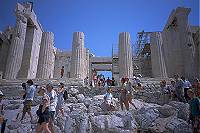 |
The other building commissioned by Pericles, the remains of which may also be found on the
Athenian Acropolis today, had absolutely nothing to do with worshipping the gods: the
Propylaia is Pericles' idea of a grand entrance (and he clearly had a knack for this sort
of thing!), but it serves a strictly secular function. Unfortunately, the Peloponnesian
War halted construction, and then Pericles died in 429, and that was the end of that - the
Propylaia was left as it was, never to be finished. See Dr. J's Illustrated Propylaia
for a good look. |
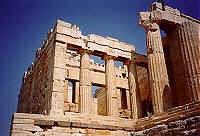 |
Even
more telling is that after Pericles died, two more buildings were erected on the
Acropolis: the Temple of Athena Nike (below left) and the Erechtheum (below right). Some
scholars believe that these were included in Pericles' original plan, but they certainly
do seem to have a different character about them: they are smaller, more delicate, and
certainly more concerned with religious ritual and worship. The little temple on the left
is dedicated to Athena Nike ("Victory") which shows gratitude to the patron
goddess for victory as opposed to pride in mortal accomplishment...and the other is the
Erechtheum, another temple to Athena (in fact, the one which would house the cult statue
of Athena Polias, terminus ad quem (goal) of the Panathenaic Procession). This building
was carefully planned so as to accommodate all sorts of older cults and shrines, so
terribly desecrated by the Persians in the previous generation.
Go to Dr. J's Illustrated Temple of Athena Nike
for a look at one of those 6th century shrines.
It certainly
appears that Pericles was influenced by Protagoras' "man is the measure of all
things" approach to philosophy. Sophocles, consummate playwright and friend to
Pericles (he even acted as Treasurer of the Confederacy of Delos, appointed by Pericles
himself) struggled with the apparently irreconcilable claims of tribal affiliation
(family) and those of the state, or the clash of the sacred
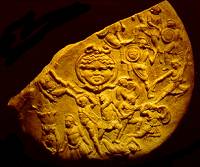 and the
secular. In his play Antigone, Sophocles struggles with the
issue of the amazing disappearing gods in Periclean Athens. In response to such currents
of thought, members of the opposing faction passed a law forbidding atheism, a law which
caused Anaxagoras, cosmologist and personal friend of Pericles, to leave the city
permanently. (You may recall that in Plato's Apology,
Socrates' accusers confuse him with this same Anaxagoras). Plutarch even tells us that
Pheidias himself dies in jail, sent there on charges that he impiously carved a likeness
of himself and one of Pericles into the shield held by his very own statue of Athena. On
the right is a photo of a Roman marble copy of this shield. One of the standing figures on
the bottom is supposed to have been Pericles, but more on this soon, I hope... and the
secular. In his play Antigone, Sophocles struggles with the
issue of the amazing disappearing gods in Periclean Athens. In response to such currents
of thought, members of the opposing faction passed a law forbidding atheism, a law which
caused Anaxagoras, cosmologist and personal friend of Pericles, to leave the city
permanently. (You may recall that in Plato's Apology,
Socrates' accusers confuse him with this same Anaxagoras). Plutarch even tells us that
Pheidias himself dies in jail, sent there on charges that he impiously carved a likeness
of himself and one of Pericles into the shield held by his very own statue of Athena. On
the right is a photo of a Roman marble copy of this shield. One of the standing figures on
the bottom is supposed to have been Pericles, but more on this soon, I hope... |
Is
Pericles' Speech a Eulogy or
a Pep Rally/Enlistment Drive? |
| What
Pericles talks about in his oration is almost eclipsed in importance by how he
delivers the message. It is Pericles' rhetoric that makes this speech famous and the model for so many others in the
course of history (Lincoln's Gettysburg Address and
John F.
Kennedy's inaugural address come immediately to mind). Rhetoric
can be defined as "the power to persuade." Throughout his speech, Pericles holds up glory as the richest incentive for
men to jump into the fray: Athens is a glorious city because of the sacrifices of previous
generations of men, and this generation, too, must shoulder its burden. And while fighting
for your country can help bring about a victory, it also has the benefit of bringing you
personal glory, something Pericles hawks as a rare and precious commodity and gained in no
other way but by dying for your country: "Realize for yourself the power of
Athens, and feed your eyes upon her day after day, till you become her devoted lover.
Then, when all her greatness breaks upon you, reflect that it was by courage, sense of
duty and a keen feeling of honor in action that men were enabled to win all this, and that
no personal failure in an enterprise could make them consent to deprive their country of
their valor, but they laid it at her feet as the most glorious contribution they could
offer. By this mutual offering of their lives made by them all, they each of them
individually received that renown which never grows old. For a sepulchre they have won not
so much that tomb in which their bones are here deposited, but that noblest of shrines
wherein their glory is laid up to be eternally remembered upon every occasion on which
deed or story shall fall for its commemoration. For heroes have the whole earth for their
tomb."
Pericles' speech is certainly
persuasive - and its emotionality is very much based in reality. It is a powerful thing to
see a nation - or a city - mourn its war dead. In the end, do you
feel that Pericles' speech is a masterpiece of rhetoric? And if so, is this a positive or
negative?
|
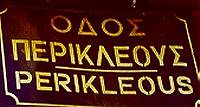  Yes, these dead Athenians Pericles speaks of have won honor
and glory and thus a kind of immortality. And as long as we still speak of them and
remember them, they will endure. Curiously, though, in addition to being remembered for
his great contributions to culture and history, Pericles has also achieved a kind of
popular fame in the Greece of our age (although certainly not the kind of fame he
anticipated). Any politician would be honored to have a street named after him (above
left), but how about a tourist shop?! Yes, these dead Athenians Pericles speaks of have won honor
and glory and thus a kind of immortality. And as long as we still speak of them and
remember them, they will endure. Curiously, though, in addition to being remembered for
his great contributions to culture and history, Pericles has also achieved a kind of
popular fame in the Greece of our age (although certainly not the kind of fame he
anticipated). Any politician would be honored to have a street named after him (above
left), but how about a tourist shop?!
excerpts of Pericles'
Funeral Oration taken from R. Crawely's translation of Thucydides' Peloponnesian War
To Dr. J's Illustrated Pericles and Philadelphia
To Dr. J's Illustrated Pericles and America
|
copyright
2001 Janice
Siegel,
All Rights Reserved
send comments to: Janice Siegel (jfsiege@ilstu.edu)
date this page was edited last:
11/27/2005
the URL
of this page:
|



















